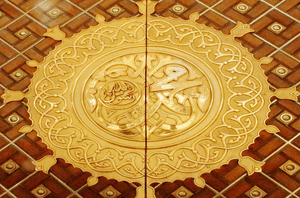Turn to Allah (‘azza wa jall) the Almighty with humility and beg Him to grant you the ability to perform your ṣalāh with khushūʿ. Have certainty in your heart that He will respond, as He so promised: “When My servants ask you about Me, truly I am near. I answer the call of the caller when he calls on Me; so let them respond to Me, and believe in Me, so that they may be guided” (2:186).
You can make duʿā’ in your own language and ask Allah to bless you with khushūʿ. Alternatively, you may wish to memorise the following supplications of our beloved Messenger ﷺ and ask Allah (‘azza wa jall) through them:
اَللّٰهُمَّ آتِ نَفْسِيْ تَقْوَاهَا ، وَزَكِّهَا أَنْتَ خَيْرُ مَنْ زَكَّاهَا ، أَنْتَ وَلِيُّهَا وَمَوْلَاهَا ، اَللّٰهُمَّ إِنِّىْ أَعُوْذُ بِكَ مِنْ عِلْمٍ لَّا يَنْفَعُ ، وَمِنْ قَلْبٍ لَّا يَخْشَعُ ، وَمِنْ نَّفْسٍ لَّا تَشْبَعُ ، وَمِنْ دَعْوَةٍ لَّا يُسْتَجَابُ لَهَا.
O Allah grant my soul taqwā (piety and mindfulness) and purify it, for You are the Best of those who can purify it. You are its Protector and Master. O Allah, I seek Your protection from knowledge which does not benefit, a heart which does not submit, a soul which is not satisfied, and a supplication which is not accepted (Muslim).
اَللّٰهُمَّ إِنِّيْ أَعُوْذُ بِكَ مِنْ صَلَاةٍ لَّا تَنْفَعُ.
O Allah, I seek Your protection from a prayer which does not benefit (Abū Dāwūd).
رَبِّ اجْعَلْنِيْ لَكَ شَكَّارًا ، لَكَ ذَكَّارًا ، لَكَ رَهَّابًا ، لَكَ مِطْوَاعًا ، إِلَيْكَ مُخْبِتًا أَوَّاهاً مُّنِيْبًا
My Lord, make me one who is extremely grateful to You, who remembers you always, who perpetually fears You, who is fully obedient to You, who is humble before You, who constantly cries and pleads with You, and who frequently turns to You in repentance (Abū Dāwūd).
اَللّٰهُمَّ أَعِنِّيْ عَلَىٰ ذِكْرِكَ ، وشُكْرِكَ ، وَحُسْنِ عِبَادَتِكَ.
O Allah, help me to remember You, be grateful to You and worship You in an excellent manner (Abū Dāwūd).
Never Give Up!
Making the human lose hope is one of Shayṭān’s most powerful tricks. You might think: “This khushūʿ thing is not for me. I’ve tried it, but I keep getting distracted.” Do not give in to this trick and continue to try. On some days your level of khushūʿ will feel strong, whilst on others, you may not feel it at all. Despite all of this, continue to work on it and do not ever give up.
“I struggled with ṣalāh for 20 years, and then I enjoyed it for the next 20 years.” – Thābit al-Bunānī (raḥimahullāh)
“I forced my nafs (inner self) to go to Allah whilst it was crying, until I was able to take it to Him whilst it was laughing.” – Abū Zayd (raḥimahullāh)
Strive for a balance
Achieving a balance is not always easy. Try to strike a balance between pushing yourself and over-doing it. Push yourself and fight your nafs to pray ṣalāh, working on both the quality and the quantity of your ṣalāh. At the same time, do not burden yourself with it so much that you find it challenging to maintain. For instance, you may attend an īmān-boosting lecture and therefore decide to get up an hour before Fajr to pray tahajjud. The first day or week may pass smoothly, but by the second week, you might start feeling like it is too much; you do not feel like waking up at all anymore, not even for 10 minutes.
Rather than immersing yourself fully, build yourself up gradually over time. Try to be consistent as consistency is the key. The Messenger of Allah ﷺ said, “The best deeds in the sight of Allah are those which are constant, even if they are few” (Bukhārī).
Accordingly, do not take an ‘all-or-nothing’ attitude. If your inner voice is saying, ‘Either I’m going to pray all of my voluntary prayers or none at all,’ then remember that it is better to pray some of them than to pray none of them.
“Indeed, these hearts have their ebbs and flows: when they are soaring, impose on them the voluntary acts; and when they are experiencing a downturn, impose on them the obligatory acts.” – ʿUmar Ibn al-Khaṭṭāb (raḍiy Allāhu ‘anhu)






